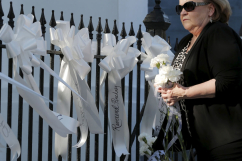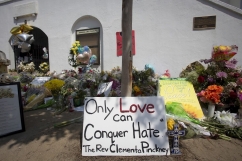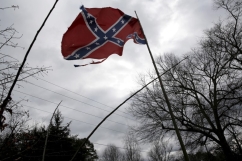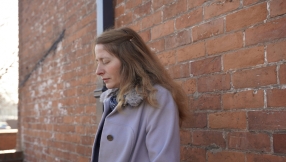Clementa Pinckney, Daniel Simmons Sr, Cynthia Hurd, Sharonda Singleton, Myra Thompson, Tywanza Sanders, DePayne Middleton-Doctor, Susie Jackson, Ethel Lance.
They shall grow not old, as we that are left grow old. Age shall not weary them, nor the years contemn. At the going down of the sun and in the morning, we will remember them.
The remembrance will be even more significant as Charleston marks one year since the deaths of nine members of the midweek Bible study at Mother Emanuel Methodist Episcopal Church. One year since Dylann Roof walked into the famous old building and sat for an hour with those who were about to become his victims. One year since he carried out his diabolical plan. One year since the victims' families' world was turned upside down forever.
The anniversary presents us with a chance to remember not just the tragedy which visited that community, but also the resurrection life to which it continues to bear witness.
The killing remains almost incomprehensible – nine people's lives ended simply because of the colour of their skin. They went out to a Bible study and they didn't come home – they would never come home again. How could someone carry out an act so heinous, so despicable, that hundreds, maybe thousands of lives will never be the same again?
After the tragedy, we began to talk about how such an abomination could have visited Charleston. We began to hear of the deeply ingrained racism which remains in parts of the South. We heard of the divisive role played by the Confederate flag, which still flies in places. We were forced to face up to the difficult conversations we needed to have about whether Dylann Roof is a terrorist and what that means for our wider debates about racism, religious fundamentalism and violence.
This national (and international) soul searching isn't enough, of course, to console the victims' families and a community ripped apart by the killings. Yet within 24 hours of the attack, the shoots of resurrection life were beginning to show.
Three words echoed from a video link into a Charleston courthouse and echoed around the world.
"I forgive you."
The stunning act of courage and grace was repeated not just by Ethel Lance's daughter but by others. "May God have mercy on your soul," pleaded Tywanza Sanders' mother in what sounded more like a prayer than a court statement. "We would like you to take this opportunity to repent," said Myra Thompson's grandson. "Repent. Confess. Give your life to the one who matters the most, Christ, so he can change your ways no matter what happens to you and you'll be OK."
Whatever else came from the aftermath of the horror in Charleston, we learned one thing above all else. These people lived the Gospel of Jesus and after their brutal deaths, their families continued that legacy under the most trying of circumstances.
Jesus, while he was dying on the cross in unimaginable pain, called out forgiveness to those who were killing Him.
For the community of Mother Emanuel, this wasn't just a story or advice for how they should behave. It was the rock on which they built their lives. When the storm came, they stood firm upon the rock and they forgave. They prayed for their persecutor. They lived out the highest calling of the Christian faith.
It's worth noting not everyone joined in with the immediate forgiveness. Still, the tone had been set and forgiveness was the tenor of almost every response. "Amid all the darkness," wrote Rod Dreher, "the light shines in the people of Mother Emanuel, and the darkness is not overcoming it. Let them be an icon to the rest of us..."
Here is the resurrection power of the saints of Mother Emanuel. They showed us how to live the Gospel in a truly radical way. What can we possibly not forgive, now that we have seen their example? Nothing can be as excruciating as losing a child. How can we do anything other than forgive when lesser evils visit us?
In his post-9/11 album, The Rising, Bruce Springsteen meditates on the colossal loss suffered in New York. He looks to first responders for inspiration. "May your strength give us strength," he sings on Into The Fire, "May your faith give us faith, may your hope give us hope, may your love bring us love." One year on, this should be our prayer for Christians and for everyone, as we reflect on the Charleston shooting.
Later on the album, Springsteen laments the loss of a loved one, "Without your sweet kiss, my soul is lost," he sings, "tell me how do I begin again?" He then discovers the answer to his own question. "With these hands... I pray for the strength, Lord. I pray for the faith, Lord. We pray for your love, Lord." As the song (My City of Ruins) reaches its conclusion, Springsteen urges, "Come on, Come on, rise up!"
It's a rousing call, and one the people of Mother Emanuel demonstrated in the aftermath of their darkest hour. Their forgiveness allowed stunning shoots of resurrection to spring from tragedy. The Confederate flag is now being removed across the South. Just this week the Southern Baptist Convention voted to repudiate the flag – surely a direct result of the actions of Mother Emanuel. Their forgiveness rolls on like a mighty river. The church is now calling for people around the world to carry out 'acts of amazing grace' as a way of marking the anniversary.
They shall grow not old, as we that are left grow old. Yet the gift of amazing grace will be with us always. Thanks be to God for them.
















